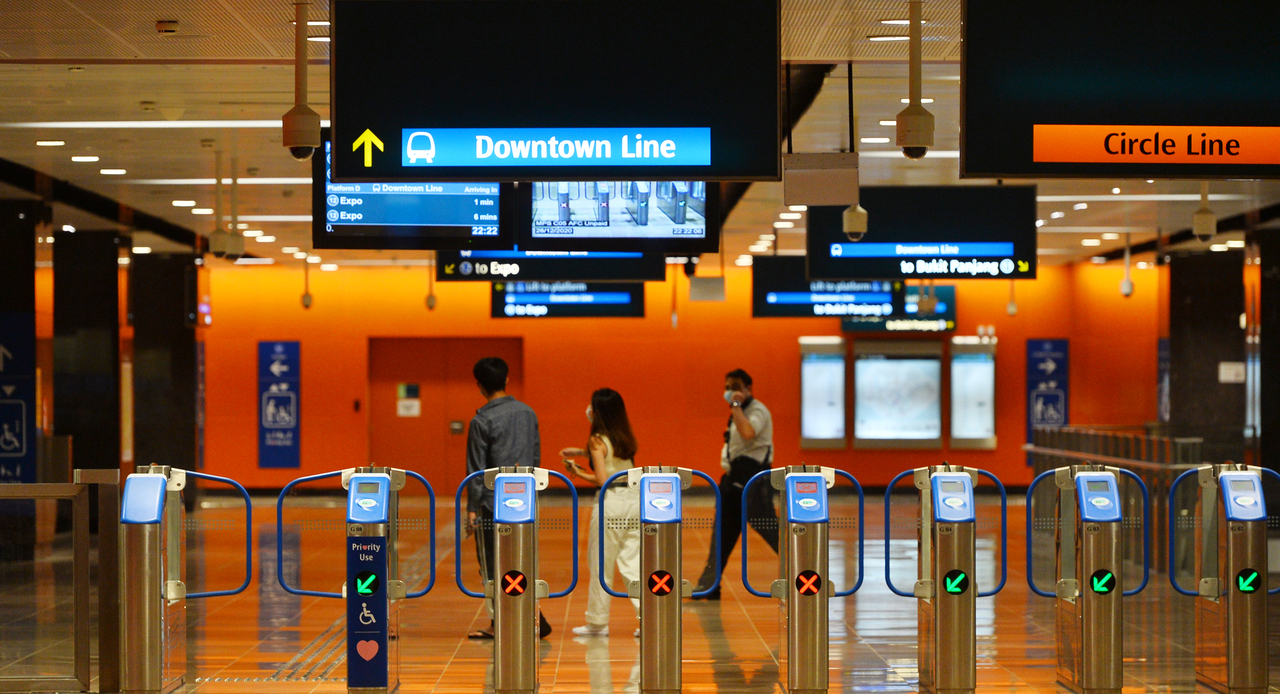Downtown Line to transition to new rail financing framework from January 2022
Sign up now: Get ST's newsletters delivered to your inbox

The Land Transport Authority and SBS Transit had reviewed the Downtown Line's financing model.
PHOTO: SHIN MIN DAILY NEWS
SINGAPORE - From next January, the Downtown Line (DTL) will shift to a financing framework that will see the Government shoulder a portion of any losses made by operator SBS Transit and get a greater share of the profits.
This will bring the DTL in line with the majority of Singapore's other rail lines, except for the new Thomson-East Coast Line (TEL), which has a model where the Government collects the fares and bears the full revenue risk.
The Land Transport Authority (LTA) and SBS Transit had reviewed the DTL's financing model to ensure it can continue to deliver reliable train services in a financially sustainable manner.
Several factors prompted the review - the first was rising costs due to higher rail reliability standards, as well as the expansion of the rail network.
This was coupled with a pronounced dip in ridership due to the Covid-19 pandemic and an expected shift in commuting patterns resulting from flexible working arrangements.
Last year, average daily ridership for the DTL fell by 46 per cent to 257,000.
LTA on Thursday (Nov 11) said the DTL was the first rail line placed on version one of the New Rail Financing Framework (NRFF) in 2011.
Under the first two versions of this framework, the operator collects fare revenue from commuters and pays the Government a licence fee to use operating assets such as the trains and signalling system.
Under the first version, the operator bore significant commercial risk as there was no mechanism for the co-sharing of losses, LTA said.
With the second version of the NRFF - introduced in 2016 - the LTA shares some of the shortfall in fare revenue should ridership fall below expectations.
Conversely, if profits exceed expectations, the LTA gets a greater share through increased licence fees paid by the operator. These fees are channelled into a fund used to renew operating assets.
This mechanism also effectively caps the operator's profit margins, LTA added.
"As public transport operations constitute a merit good, it should be a more stable business to ensure commuters continue to enjoy reliable train services," it said.
Hence, the balance of risks borne by the Government and operator needed to be adjusted, LTA added.
In a statement on Thursday, SBS Transit said the new financing framework will reduce commercial volatility for the firm.
SBS Transit chief executive Cheng Siak Kian noted that it is uncertain when travel and economic activities will recover to pre-Covid-19 levels.
Ridership patterns could also shift significantly post-pandemic as more commuters work from home, he added.
"The new licence framework is certainly a more sustainable model for the group's rail operations and will enable us to focus on the operations and maintenance of the rail systems," he said.
LTA said SBS Transit will be given a single 11-year licence to operate all three of its rail lines - the DTL, the North East Line and the Sengkang-Punggol LRT - under version two of the NRFF.
As part of this transition, SBS Transit must hand over its rail advertising business to the LTA from 2024, and may need to pay a fee to continue operating the advertising business after that.

<p>A two-car train travelling past Sengkang Depot on February 5, 2021. </p>
PHOTO: ST
Meanwhile, five of SBS Transit's bus contracts - Bedok, Tampines, Serangoon-Eunos, Clementi and Bishan-Toa Payoh - will be extended by an average of three years.
However, SBS Transit will receive a lower fee for these contracts.
The financing model for buses differs in that the Government pays operators a fee to operate routes, but collects the fare revenue.
The revised fee was benchmarked against recent bus tender prices, which have fallen by about 15 per cent, said LTA.
These arrangements will help to preserve the balance in costs incurred by SBS Transit and the Government due to the change in the DTL's financing model.
The Bedok bus contract would have expired in 2023, Tampines in 2024, Serangoon-Eunos and Clementi in 2025 and Bishan-Toa Payoh in 2026.
Transport economist Walter Theseira said the restructuring of the DTL's financing model would have happened sooner or later.
Since the first stage of the 42km-long rail line opened in late 2013, ridership has fallen short of initial forecasts and Covid-19 only made it worse.
The DTL was projected to have a daily ridership of around 500,000 after all three stages had opened.
Said Associate Professor Theseira: "If the ridership doesn't materialise, you cannot run these services at an operating profit."


